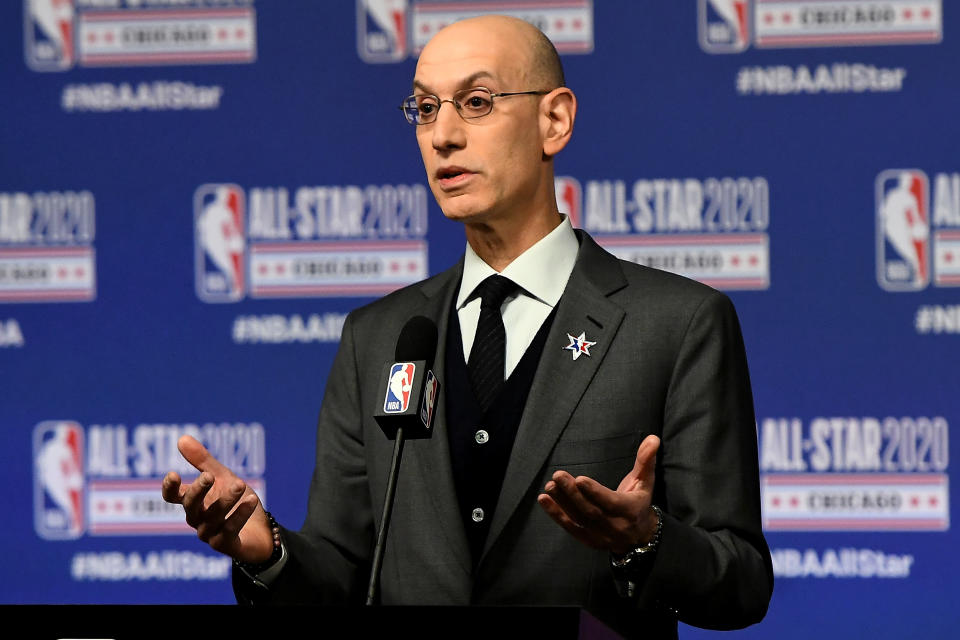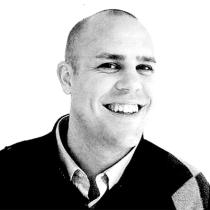It is time for the NBA to call off the 2019-20 season
That’s right: It is time for the NBA to call off the 2019-20 season.
I have been circling this determination for weeks, and ever since the league announced plans this month to resume the season at Walt Disney World in July, every concern we have shared is coming to fruition.
And then some.
We have hit double digits on the number of players who have already tested positive for coronavirus upon reporting to teams for individual workouts. Citing myriad reasons, multiple players have opted out of participating in the 22-team restart, slated to commence at the ESPN Wide World of Sports Complex on July 30. COVID-19 cases have exploded in Orlando, Florida, the city surrounding the single-site location. And a number of players are trepidatious about distracting from the ongoing social justice movement.
That sums up the worst of it, but there are many more reasons cramming hundreds of people into one of the nation’s largest coronavirus hotspots to play an indoor contact sport is a terrible idea. There is really only one reason to even consider it, and it has nothing to do with player safety. As Memphis Grizzlies forward Justise Winslow shared on his Instagram story this past week, “All About The Benjamins, baby.”
The financial incentives are incredibly tempting (an estimated $1 billion split between team owners and players) and a worthy conversation, but the NBA is far from essential. There are players who live paycheck to paycheck, as hard as that may be to believe in a sport that pays the least experienced among them a minimum salary of $898,310, but the wealthiest players have driven the game’s return in coordination with billionaires who could easily afford to pay everyone in their employ through 2020.
Now is probably a good time to mention the highest-income Americans have disproportionately cut spending during the pandemic, according to Opportunity Insights researchers at Harvard University.
NBA team owners will shred the current collective bargaining agreement under its force majeure clause if the season does not resume, leveraging future financial uncertainty against players and possibly setting potential earnings back a decade. But franchise owners will likely enact the clause anyhow. Depending on them to do right by the players is a fool’s errand, but majority white team owners bargaining for a greater percentage of their majority Black employees’ earnings is a public relations nightmare. The players have leverage, too.
But enough about collective bargaining. There are greater concerns at play.
Washington Wizards forward Davis Bertans cited one of them on Monday, reportedly opting out of the remainder of the season as “a preventative measure” against potential health risks of playing in Orlando. Bertans will be an unrestricted free agent at season’s end and stands to earn a significant raise from his current $7 million salary. In other words, he is financially incentivized not to play and to remain healthy.
Not only must players worry about contracting coronavirus, they also face increased injury risk following an extended layoff. Many players could not engage in their usual offseason workout routine during the pandemic. Even those who managed to stay conditioned now have just three weeks of training camp to get into game shape before immediately jumping into high-stakes competition in a condensed schedule.
This is not how the NBA is supposed to operate.

Case in point: Portland Trail Blazers forward Trevor Ariza also opted out of Orlando on Monday, in order to spend a month with his 12-year-old son during a custody battle, according to ESPN’s Adrian Wojnarowski. That is just one example of how the league’s restart forces players to choose between their families and their jobs. Ariza reportedly stands to lose as much as $1.8 million by deciding not to play.
This is nowhere near what players originally signed up for. Families are not permitted to join players in Orlando until Aug. 30, when the second round of the playoffs commences, and even then each team is allotted only 17 additional hotel rooms for 17 roster spots. Players could go more than seven weeks in quarantine without seeing their families during one of the most volatile times in the country’s history.
There are those who will say it is the players’ job to play, and they are paid handsomely to do so. Several players have even expressed a desire to play in order to maximize the amount of money they can pour back into their communities as part of the Black Lives Matter movement, and that is commendable. The NBA could have an unprecedented opportunity to raise awareness to social justice causes in Orlando.
But there are at least an equal number of players who have expressed publicly their belief that the NBA’s restart could distract from a movement in which so many of their colleagues have been on the frontlines. Kyrie Irving is among them. The injured Brooklyn Nets star coordinated a conference call in order to allow rank-and-file members to voice concerns about resuming play, ranging from the social justice cause to the extended time away from family and fear of the coronavirus. (Oh, don’t worry, we’ll get to COVID-19.)
Los Angeles Lakers teammates Avery Bradley and Dwight Howard also shared reservations about leaving their communities during global protests against racial injustice to resume the NBA season. Bradley opted out of Orlando on Tuesday, citing both his continued support of the Black Lives Matter movement and the health of his 6-year-old son, who reportedly has a history of respiratory illness.
My takeaway from reported conversations on the conference call that included nearly one-fifth of the NBA’s players was that they previously felt unheard. There is no telling how many feel pressured to participate in Orlando by a group of superstars who unanimously favored resuming the season before the temperature was taken around the league. Superstars are also among those who stand to benefit the most from playing out the 2019-20 campaign. The players’ association also unanimously agreed to further discuss the league’s 22-team restart in early June, but the two sides did not come to a formal agreement until Tuesday, when the wheels were in motion and a winnowing timeline forced a decision.
In the hours after the deal was reported Tuesday, news surfaced that at least seven players tested positive for COVID-19. Four unnamed members of a Western Conference playoff team, two Phoenix Suns and Denver Nuggets star Nikola Jokic could not be cleared to report to their teams, according to reports.
Indiana Pacers guard Malcolm Brogdon and Sacramento Kings forward Jabari Parker both publicly revealed positive coronavirus tests on Wednesday. Another Kings player also reportedly tested positive.
There are two weeks remaining for players with the virus to quarantine and be cleared for the start of training camp on July 11 in Orlando. While no player has made public an experience with life-threatening symptoms resulting from the virus, there is ample evidence that COVID-19 can be deadly for relatively young and otherwise healthy adults, even if the odds are in their favor. Some have suffered strokes. Long-term effects from the virus are relatively unknown, but both brain and lung damage are potential concerns, and there is no way of knowing how players with the virus now will respond in August.
A 113-page memo the NBA sent to teams last week outlined extensive testing guidelines and precautionary measures against an outbreak, but the Disney employees responsible for providing services to players and coaches are among those who are not beholden to the same level of scrutiny. Epidemiologists have expressed serious doubt the NBA can keep the virus at bay. Many of those employees are also petitioning for Disney and government officials to reconsider the amusement park’s scheduled reopening next month.
Orlando is experiencing an explosion of the coronavirus. Florida has shattered records day after day, reporting more than 5,500 new cases on Wednesday. Orlando is the second-hardest hit city in the state. Given their consultation with infectious disease experts, the NBA should have been well aware that Florida Gov. Ron DeSantis’ early decision to reopen the economy heightened the risk of this explosion.
NBA commissioner Adam Silver acknowledged the spiking COVID-19 statistics and struck a “resolute but somber” tone in a recent call with team executives, prompting concern at every level of the league, ESPN’s Baxter Holmes and Zach Lowe reported on Saturday, when Florida reported 4,000 new cases.
“It seems almost impossible to imagine the virus won’t get inside the bubble,” University of Washington epidemiology professor Jared Baeten told Yahoo Sports’ Henry Bushnell, “given rising case numbers.”
An outbreak on the National Women’s Soccer League’s Orlando Pride, which forced the team to withdraw from the league’s Challenge Cup, raised concerns about false negative tests potentially spreading the virus like wildfire among teammates and opponents in close contact. European soccer was set up to succeed in avoiding serious outbreaks, but there were nearly as many positive tests in Orlando over the past 24 hours as there has been in all of Germany in the past two weeks. The outbreak that forced a Russian team to field replacement players last week is more analogous to the NBA’s restart.
The odds of crowning an illegitimate NBA champion have increased significantly over the past week. We may have already reached the tipping point, since withdrawn players have dealt a blow to the Lakers’ title chances and further weakened playoff prospects for the Wizards and Blazers. More players can opt out by July 1. On the flip side, other players who would have missed the regularly scheduled playoffs may now be available. And according to Wojnarowski, some teams currently outside the playoff picture plan to treat Orlando as “an extended summer league to develop young players and protect veterans.”
There is also the real possibility that COVID-19 sidelines more players once the season commences. What if a quarantined superstar misses an entire playoff series? Or an entire rotation is locked down? Any champion outside the Lakers, Los Angeles Clippers and Milwaukee Bucks will be met with raised eyebrows, and skepticism could even follow the favorites if any of those teams’ players are not available.
The risk of a watered-down product at the expense of player safety is great.
And God forbid a single person dies from coronavirus as a result of the NBA’s restart, whether a service worker spreads it to a player and his family members or the reverse. There is no financial incentive for the league that could justify that. Broadly, the NBA would be a lot better off canceling this season now and prioritizing a safe return to the 2020-21 campaign than calling it off again midstream come September.
History will remember this time in our life for far different reasons than who won an NBA ring in 2020.
– – – – – – –
Ben Rohrbach is a staff writer for Yahoo Sports. Have a tip? Email him at rohrbach_ben@yahoo.com or follow him on Twitter! Follow @brohrbach
More from Yahoo Sports:


